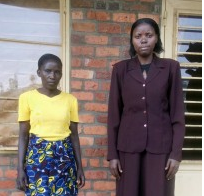Resource information
[from UNWomen] When Thabita Mukamusana’s partner died shortly after the birth of their child, she raised their son without hope of connecting him to his paternal family, or his inheritance, in her village in south-west Rwanda. Because the boy had been born outside of marriage, she believed that any claim would be impossible. Yet things recently turned around when she was able to access free legal aid for herself and her son, now 19.
With the help of a paralegal, and supported by a local NGO, Mukamusana managed to claim her son’s right to his father’s land and property through a local court, securing a better future for him and herself.
In Rwanda, land and property laws have traditionally favoured men. Although a series of recent laws and policies have increased women’s rights to inherit land, own matrimonial property and take decisions in matters of family property, significant barriers remain. Many of these relate to the lack of independence that women have in other areas of life.
Due to stereotypes and discrimination, women have less access to information. They are often unable to keep track of their husbands’ economic activities, or protect themselves from intimidation from family members. And many women, unable to negotiate their sexual relationships, have children outside of formal marriage and are less protected by the law.
Legal barriers also remain. State officials in Rwanda are often unaware of the new laws , or continue to practice according to old mind-sets. And for women, who are less educated or familiar with public affairs, accessing the court process can be intimidating and confusing.
In response to these problems, since 2011 an intervention programme has been working to increase the knowledge and reach of legal staff throughout the country on women’s land issues.
Partnering with the government, the RCN Justice & Démocratie, a Belgian NGO, and the local Haguruka Association, which is supported by UN Women’s Fund for Gender Equality, have been recruiting and training paralegals in 15 of Rwanda’s districts.
So far the programme has trained 204 paralegals – many of them women – on Rwanda’s relevant family and land laws, and its legal and policy framework on women’s rights. Working with trained lawyers and travelling to remote village areas to host mobile legal clinics, they have worked on 1,508 women’s legal cases, just in the last year and a half.
And while change – and court procedures – can be slow, progress is beginning to take shape. Like Thabita Mukamusana, some have gained control of the property of partners who died; and divorced women have managed to keep the rights to their matrimonial homes or properties. In some villages, women and girls have become the legal owners of large plots of land that they can now use as collateral to access bank credit and loans.
The programme is contributing to a shift in gender stereotypes in Rwanda, at all levels. Community monitors, trained by the NGOs in partnership with government ministries, are tracking attitudes towards women and their land rights and holding awareness discussions in their neighbourhoods. And through dialogues with government institutions, the hope is to better align Rwanda’s laws and development plans with international laws on women’s rights, and further their implementation.
For original article visit https://www.unwomen.org/2012/06/making-land-laws-work-better-for-women-in-rwanda/?utm_source=feedburner&utm_medium=twitter&utm_campaign=Feed%3A+ungen+%28UN+gender+equality+news+feed%29

